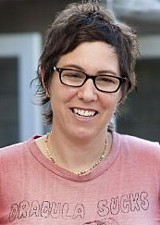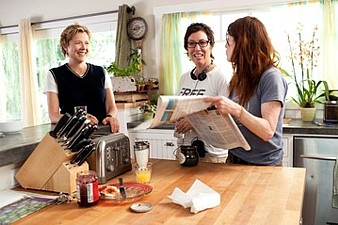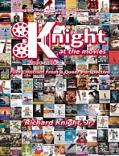
Kids Are All Right co-writer Lisa Cholodenko and onset with stars Annette Bening and Julianne Moore
film from a queer perspective
Interview
| KATM media outlets |
| KATM featured weekly |
| Join Us! |
| KATM on RT |
| Vidcast Starring KATM |
| NOTE: THIS SITE ONLY LOADS CORRECTLY WITH EXPLORER AND MOZILLA BROWSERS - SORRY SAFARI USERS! |
| Buy the KATM Book |
Lisa Cholodenko and Her "Kids"
Expanded Edition of 7-7-10 Windy City Times Interview
By Richard Knight, Jr.
Expanded Edition of 7-7-10 Windy City Times Interview
By Richard Knight, Jr.
| Out filmmaker Lisa Cholodenko is beloved by LGBT audiences for her challenging relationship films High Art and Laurel Canyon. Now, with The Kids Are All Right, a dramedy starring Annette Bening and Julianne Moore as a lesbian couple faced with relationship troubles, not to mention the prospect of trying to incorporate their unknown sperm donor (played by Mark Ruffalo) into their lives at the behest of their two teenage children, Cholodenko, who directs and co-wrote the script with Stuart Blumberg over a five year period, has made what is not only a movie for LGBT audiences to treasure but one of the best films of the year. As Cholodenko, who sounds eerily like Bening in person had a belated late lunch of a tuna nicoise salad, she discussed the long gestation of the exceedingly detailed script which led to an intense but brief shooting period for The Kids Are All Right. Excerpts: WINDY CITY TIMES (WCT): This script, by yourself and Stuart Blumberg, is so incredibly nuanced – every character has a moment to shine. I believe you reconnected with him in a coffee shop and asked him to work with you on the script. How far along in the process were you at that point? LISA CHOLODENKO (LC): I had the premise; the set up. I had ideas that I wanted to hit and I said to Stuart, “I think it’s sort of ending up in this place but I don’t really know” so it was incredibly loose aside from those signposts. Stuart told me he’d been a sperm donor in college and I thought, “Well, that’s kismet that we’re meeting” and, “Why don’t we do this together?” The original idea was mine and I take credit for it but we did the heavy lifting together. One of the things that attracted me to Stuart was that he was more comfortable with his bold choices and cutting things off and moving to the next scene and inventing new ways to express some things whereas I would typically try to work through them in a very methodical way. He walked out of the box more than I did. My tendency is to go deeper and find the layering of things a little bit more easily. WCT: It’s fascinating that a script can be so malleable. You spent all this time writing it and then when Annette came in, she had some great ideas having to do with her character leading to more changes. LC: Hers was really more that she had read a couple of versions of the script and wanted to reinstate some of the things that got cut. It was all really talking about reworking things that had been in existence. I don’t think we really invented anything from scratch for her. WCT: How did you create this intimacy between these actors in such an incredibly short shooting schedule – it was like 23 days I believe. It’s especially potent between Julianne and Annette. Those dinner scenes are really believable with all the little touches. LC: They all came out and they all knew it was going to be a really quick shoot and I think when you spend that much time with a script the details are pretty well expressed so there’s not much going in the blank. They know what their scene is and what they’re going to be doing in it and what they’re saying and what it means. All that stuff is kind of there for them. We went over the scenes; we had like a total of five days rehearsal so I would mix and match and get the family together for one or two rehearsals and then do something with Annette and Julianne. But it was also just one of those kismet-y things where I just knew what I was looking for and I think it was translated well in the script and I think I cast it right and we just got to it. WCT: The script offers both actresses beautiful, individual moments. Annette has that beautiful monologue about Joni Mitchell. LC: Yes, she’s spectacular in that, I think. WCT: She is spectacular and I love that that scene also points out how important an ingredient music is in your films. It certainly is here. Let’s immediately clear this up – is the title supposed to be an off-kilter play on the Who’s “Kids Are Alright” song? It’s elusive that title – “All right” instead of “alright.” LC: It was a copyright issue but we sort of liked it in the end because it’s like “all” meaning (emphasizes) all of them are all right. We picked it out of the grab bag of working titles. WCT: When Annette says something to Mark like, “I don’t know many straight men who are into Joni Mitchell” I immediately thought of Laura Nyro – I don’t know a lot of straight guys who love her either. LC: I love Laura Nyro and I’ll tell you, at a certain point we weren’t certain if we wanted to shell out the dollars to license the rights for the Joni Mitchell song so we were on the fly trying to figure out what was the next best thing and I was like, “Why don’t we have her sing “Stoned Soul Picnic?” Which would have been funny. WCT: I love Joni but would have probably lost it if she’d sung Laura. Now, I hate hearing that a film like this had trouble getting financed. LC: I know. It’s a bummer, huh? WCT: Yes it is. But you finally did it and it’s receiving critical raves and hopefully will find an audience and maybe into the awards circle. Are you hopeful that the climate for gay and lesbian themed movies will change? I mean, it was so great to see a gay movie where no one died! (laughs) LC: Right! I mean no Children’s Hour for me. You know, I’m really into the idea that there’s space for everyone. There’s been gay content in all of my films and you could call them lesbian films or gay films for sure but I think for me there has to be more to the narrative than just the “gay” per se experience. That in itself is not so interesting to me. WCT: At one point Julianne exclaims into the phone, “I’m married!” but we don’t really know that the two have taken vows or what and because the film is set in California the question sort of hung in the background for me. Was a wedding between Nic and Jules ever in the script? LC: No. We felt like whether they’re married by law or married in their own conception of marriage – they wear rings and stuff – that’s really all we needed. They consider themselves married; they have a domestic life together and children together and I felt it was okay that we don’t really know if they’ re married or domestic partners or whatnot. The point of this film is to be subversive in the sense that it’s anti-political. I don’t want any rainbow flags in this movie – I want it to just feel like…straight forward. Gay people do it just like straight people. WCT: Your writing partner commented, “Gay people deserve to be as miserable as straight people” (laughs) and we really see that. There’s no difference between the two. It’s not ever discussed or is an issue – which in itself is, as you say, a political statement. There’s no bones about it – this is a family. LC: Right. And I thought, “That’s more powerful if I don’t make it political. If I don’t talk about the issues.” There’s a few things – where she says, “Paul, I’m gay!” and hangs up the phone or when Joni comes in and says, “Here, now you have your perfect lesbian family.” But those things are sort of contextually important I think and not so important for the über message of the film. I think the message is clear. WCT: Why is the film which seems to have such award possibilities being released in July – way before awards season? LC: I think they in a very calculated way said, “This would be a great movie for counter programming.” It is set in the summer and has that breezy summery thing and it’s a family movie so there’s a nice symmetry there. I think the idea of counter programming is kind of clever – why not get it out earlier and milk it through the season? WCT: Well the counter programming idea certainly has worked for me – talk about a refreshing change of pace after a summer of sequel-itis. But perversely, I wonder – if you got offered one of those mega budget, mega special effects things, would you do something out of the relationship genre? LC: Yeah, I definitely am and I’ve made it known that I am. I read stuff and I’ve turned things down along the way and I hope I don’t have to for very long. I hope that someone has a script that resonates with me on some level enough for me to want to do it. WCT: And I hope that everyone comes out to see The Kids Are All Right – one of the best films of the year. We’re certainly going to encourage everyone to do that. LC: Good! Thank you. I think it’s worth their time. |





